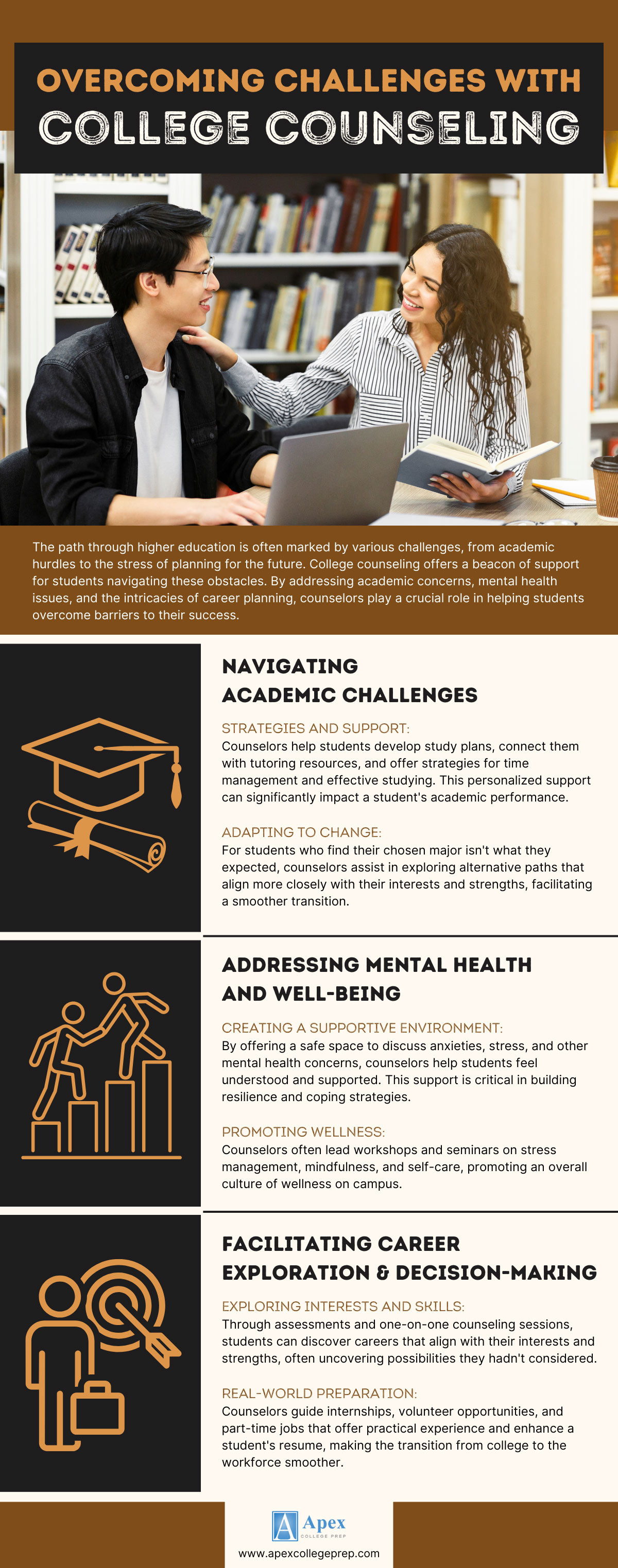Starting college can be a big step that brings up a lot of questions and decisions for students and their families. That’s where college counseling comes in—it’s more than just help with picking classes. This guide will show how college counselors help students figure out everything from choosing the right college to planning their careers and even dealing with stress.
College counselors give advice, point students to resources, and support them through tough times, making the college process clearer and less overwhelming. Let’s look further into how college counselors make a difference in students’ lives, helping them make smart choices, face challenges, and set themselves up for a good future.
Understanding the Role of College Counselors

College counselors serve as a guiding light for students during a pivotal time in their academic and personal lives. Their roles encompass support services, including academic advice, career planning, and individual counseling. Let’s delve into the profound impact these professionals have on student success.
- Academic Guidance
College counselors are key to helping students understand the academic demands of college. They offer:
- Course Selection Advice: Assisting students in choosing courses that align with their interests and academic goals while ensuring they meet graduation requirements.
- Academic Planning: Helping students develop a comprehensive plan for their college education, including selecting a major, planning for study abroad opportunities, or identifying research opportunities.
- Academic Support and Intervention: Identify struggling students and provide or direct them to academic support services, such as tutoring or study skills workshops.
- Career Planning and Preparation
A significant part of a college counselor’s role involves preparing students for their future careers. This includes:
- Career Exploration: Assisting students in exploring different career paths and understanding the qualifications required for various professions.
- Internship and Job Search Assistance: Providing resources and guidance on finding internships and part-time jobs that offer relevant experience.
- Graduate School Advising: For students considering advanced education, offering advice on the application process, entrance exams, and choosing the right program.
- Emotional and Psychological Support
College counselors also address the mental health needs of students, providing:
- Personal Counseling: Offering a confidential space for students to discuss personal issues, such as stress, anxiety, relationship problems, or homesickness.
- Crisis Intervention: Responding to students in crisis, providing immediate support, and referring them to appropriate mental health services if needed.
- Well-being Workshops: Organizing workshops and seminars on stress management, time management, and mindfulness to promote overall well-being.
- Navigating College Life
Adjusting to college life can be challenging, and college counselors play a crucial role in helping students navigate this transition. They offer:
- Orientation Programs: Leading sessions during orientation that help new students acclimate to college life.
- Social and Extracurricular Engagement: Encouraging students to engage in extracurricular activities and social events to enhance their college experience and build community.
- Resource Connection: Connecting students with campus resources, such as financial aid, housing, and health services, to ensure they have the support they need.
- Advocacy
College counselors also serve as advocates for students, working to:
- Identify and Remove Barriers: Recognize systemic or institutional barriers to student success and work with college administration to address them.
- Support Diversity and Inclusion: Advocating for policies and practices that support a diverse and inclusive campus environment.
- Facilitate Accommodations: Assisting students with disabilities in obtaining the necessary accommodations to support their learning.
The role of college counselors is indispensable in guiding students through the complexities of college life and beyond. They are mentors, advisors, and advocates who play a critical role in ensuring that students succeed academically and thrive personally and professionally. By addressing the holistic needs of students, college counselors contribute significantly to the development of well-rounded individuals prepared for future challenges.
Personal Impact of College Counseling

The journey through college is fraught with decisions that can shape one’s future in profound ways. College counseling is pivotal in navigating this journey, providing support that spans academic planning, the college application process, and career exploration. Let’s explore the transformative impact of college counseling on these aspects.
Academic Planning and Support
College counseling is instrumental in laying a solid academic foundation. Counselors help students understand college prerequisites, select courses that align with their interests and career goals, and keep them focused on their academic objectives. This guidance is invaluable in creating a tailored educational experience.
A student might share how their counselor recommended taking advanced courses in subjects they were passionate about, leading to improved engagement and grades. Another might reflect on how a counselor’s advice to balance challenging courses with their workload helped maintain their overall academic performance, preventing burnout.
College Application Process
The college application process can be overwhelming, but counselors demystify this journey, guiding students every step of the way. They assist in selecting colleges that match the student’s academic and personal preferences, crafting standout applications, and navigating the complexities of financial aid and scholarships.
- Choosing the Right Colleges: Counselors help students identify colleges that meet their academic needs and social and extracurricular interests.
- Crafting Applications: Guidance on writing compelling personal statements and essays that reflect the student’s unique story can be transformative. Counselors offer critical feedback that sharpens and refines these application components.
- Personal Reflections: Many students can recall specific instances where their counselor’s insights led to a stronger application. Whether it was choosing the right story for a personal essay or selecting colleges that were a perfect fit for their goals, these moments are pivotal in the application journey.
Career Exploration and Guidance
Exploring potential career paths is a crucial part of the college experience. Counselors provide resources, workshops, and one-on-one sessions that help students understand their strengths and how these align with various career options.
- Aligning Educational Paths with Career Goals: Counselors assist students in selecting majors and courses that align with their career aspirations, ensuring that their educational journey is purposeful and directed.
- Personal Reflections: Students often discover new career possibilities through counseling sessions. For example, a student interested in science might learn about bioinformatics from their counselor, opening up a new and exciting career path that perfectly blends their interests in biology and computer science.
The impact of college counseling cannot be overstated. From academic planning and the application process to career exploration, the support and guidance provided by counselors are fundamental to student success.
Overcoming Challenges with College Counseling

The path through higher education is often marked by various challenges, from academic hurdles to the stress of planning for the future. College counseling offers a beacon of support for students navigating these obstacles. By addressing academic concerns, mental health issues, and the intricacies of career planning, counselors play a crucial role in helping students overcome barriers to their success.
Navigating Academic Challenges
Academic challenges are a common part of the college experience. Whether it’s struggling with a particular subject, managing a heavy course load, or facing the pressures of maintaining a certain GPA, college counselors provide the support needed to navigate these hurdles.
- Strategies and Support: Counselors help students develop study plans, connect them with tutoring resources, and offer strategies for time management and effective studying. This personalized support can significantly impact a student’s academic performance.
- Adapting to Change: For students who find their chosen major isn’t what they expected, counselors assist in exploring alternative paths that align more closely with their interests and strengths, facilitating a smoother transition.
Addressing Mental Health and Well-being
College can be stressful, and mental health challenges can impede a student’s academic and personal life. Counselors are equipped to provide support through direct counseling services or by referring students to mental health professionals.
- Creating a Supportive Environment: By offering a safe space to discuss anxieties, stress, and other mental health concerns, counselors help students feel understood and supported. This support is critical in building resilience and coping strategies.
- Promoting Wellness: Counselors often lead workshops and seminars on stress management, mindfulness, and self-care, promoting an overall culture of wellness on campus.
Facilitating Career Exploration and Decision-Making
The prospect of choosing a career and making post-graduation plans can be daunting. College counseling services extend to career exploration, helping students understand their options and make informed decisions about their futures.
- Exploring Interests and Skills: Through assessments and one-on-one counseling sessions, students can discover careers that align with their interests and strengths, often uncovering possibilities they hadn’t considered.
- Real-World Preparation: Counselors guide internships, volunteer opportunities, and part-time jobs that offer practical experience and enhance a student’s resume, making the transition from college to the workforce smoother.
Measuring the Impact of College Counseling

Evaluating the effectiveness of college counseling is essential for understanding its value in students’ educational journey. The impact of counseling extends beyond immediate academic performance, influencing students’ mental health, career readiness, and overall well-being. Let’s explore the key metrics and methods used to assess the outcomes of college counseling.
Academic Success Metrics
The influence of college counseling on academic performance is one of the most straightforward aspects to measure. By examining the following indicators, institutions can gauge the effectiveness of their counseling services:
- Grade Point Average (GPA): Monitoring changes in GPA before and after counseling can provide insights into academic improvement.
- Course Completion Rates: Increased rates of course completion and reduced withdrawal rates may indicate effective academic advising and support.
- Graduation Rates: Higher graduation rates suggest that counseling services are successfully helping students navigate their academic paths to completion.
Mental Health and Well-being Indicators
Assessing the impact of counseling on students’ mental health and overall well-being requires a more nuanced approach, often involving qualitative data:
- Survey Feedback: Pre- and post-counseling surveys can capture students’ perceptions of their stress levels, mental health status, and overall satisfaction with their college experience.
- Utilization Rates: Increased counseling services may reflect greater awareness and reduced stigma, while consistent engagement indicates perceived value among students.
Career Preparation and Outcomes
The effectiveness of career counseling can be measured through post-graduation outcomes and students’ readiness to enter the workforce:
- Employment Rates: Tracking the employment rates of recent graduates can indicate how well students have been prepared for the job market.
- Career Alignment: Surveys measuring the degree to which graduates work in fields related to their major can assess the effectiveness of career guidance.
- Internship and Practical Experience: The number of students securing internships and other practical experiences while in college serves as a metric for the effectiveness of career counseling in providing real-world exposure.
Qualitative Measures and Personal Testimonies
Beyond quantitative data, personal stories and qualitative feedback are invaluable in measuring the impact of college counseling. These narratives provide depth to the statistics, highlighting transformative experiences and long-term benefits that may not be immediately apparent.
- Success Stories: Personal testimonies from students who have overcome academic or personal challenges with the help of counseling illuminate the profound impact these services can have.
- Faculty and Staff Observations: Feedback from faculty and staff can provide additional insights into student behavior, engagement, and performance changes.
Additional Benefits of College Counseling

College counseling benefits students in several meaningful ways beyond direct academic and career support. These additional benefits enrich the student experience, contributing to their overall growth and preparedness for life after college. Let’s delve into some of these key advantages:
- Enhanced Self-Awareness: College counselors often use assessment tools to help students understand their personality traits, strengths, and weaknesses. This insight can guide students in making informed decisions about their majors, careers, and personal growth opportunities.
- Improved Decision-Making Skills: Counselors expose students to a wide range of academic and career possibilities, equipping them with the knowledge to make choices aligned with their interests and goals. Through discussions and guidance, counselors encourage students to weigh the pros and cons of different paths, fostering critical thinking and decision-making skills.
- Increased Resilience and Coping Strategies: Counseling services offer strategies for managing stress, anxiety, and other emotional challenges, promoting resilience in facing academic pressures and ups and downs. College counselors also support students through transitions, whether adjusting to college life, changing majors, or preparing for graduation, helping them confidently navigate change.
- Development of Life Skills: Counseling sessions often cover practical skills like time management, organization, and goal setting, which are invaluable in college and beyond. Counselors model effective communication and provide opportunities for students to develop these skills through workshops and group counseling sessions.
- Support Network: College counselors can help students build a support network by connecting them with peers, faculty, and professional mentors. Students are often introduced to various community resources and services through their counseling center, broadening their support system outside the college.
- Accessibility to Resources: Counselors guide students in identifying and applying for scholarships and financial aid, easing the financial burden of college education. Counseling centers often work closely with health and wellness services on campus, ensuring students have access to comprehensive care.
- Confidence and Independence: Through counseling, students learn to advocate for themselves, which boosts confidence and independence. Counselors encourage a sense of personal responsibility, preparing students to take charge of their lives and decisions.
- Cultural and Social Awareness: Counseling services promote an understanding and appreciation of diversity, preparing students to thrive in a multicultural world. Many counseling centers include programming around social justice issues, encouraging students to become informed and engaged citizens.
The benefits of college counseling are wide-ranging, touching every aspect of a student’s life. By providing a holistic support system, college counselors play a crucial role in shaping students who are academically accomplished, emotionally intelligent, socially aware, and prepared to make meaningful contributions to society.
Conclusion
The role of college counseling in a student’s journey cannot be overstated. From academic guidance and career planning to personal growth and resilience building, college counselors offer an indispensable support system. They guide students through the complexities of college life and empower them to make informed decisions, develop critical life skills, and navigate challenges confidently. The benefits of engaging with college counseling services extend far beyond the campus gates, setting students up for success in their personal and professional lives.
Apex College Prep stands ready to assist students and families looking to navigate the college preparation and application process with ease and confidence. With a team of experienced college counselors, Apex offers personalized support tailored to each student’s unique needs and goals. Whether you’re seeking academic advising, career guidance, or support for personal development, Apex College Prep is your partner in achieving success.
Don’t navigate the challenging waters of college preparation and decision-making alone. Reach out to Apex College Prep today and take the first step towards unlocking your full potential with the support of expert college counseling.

